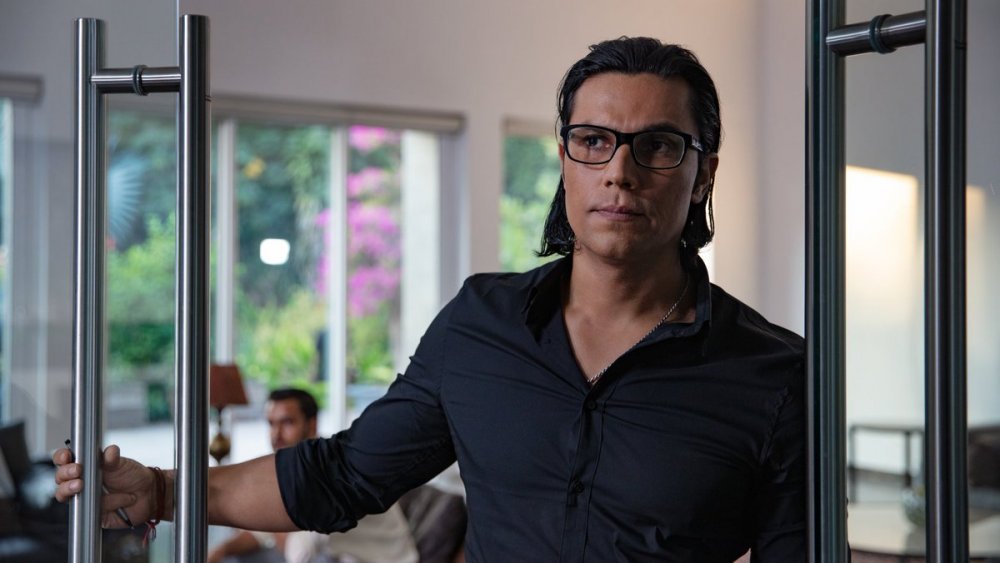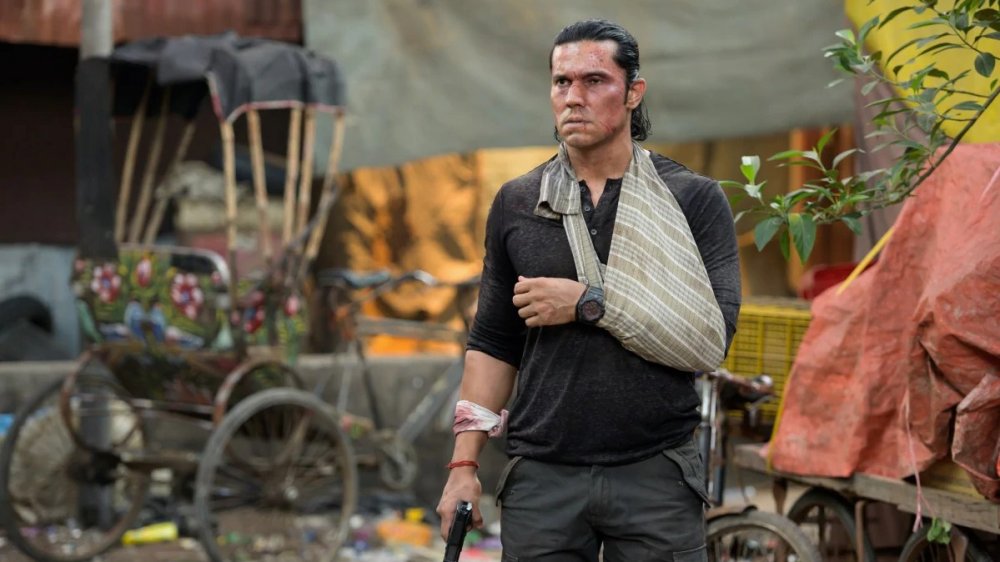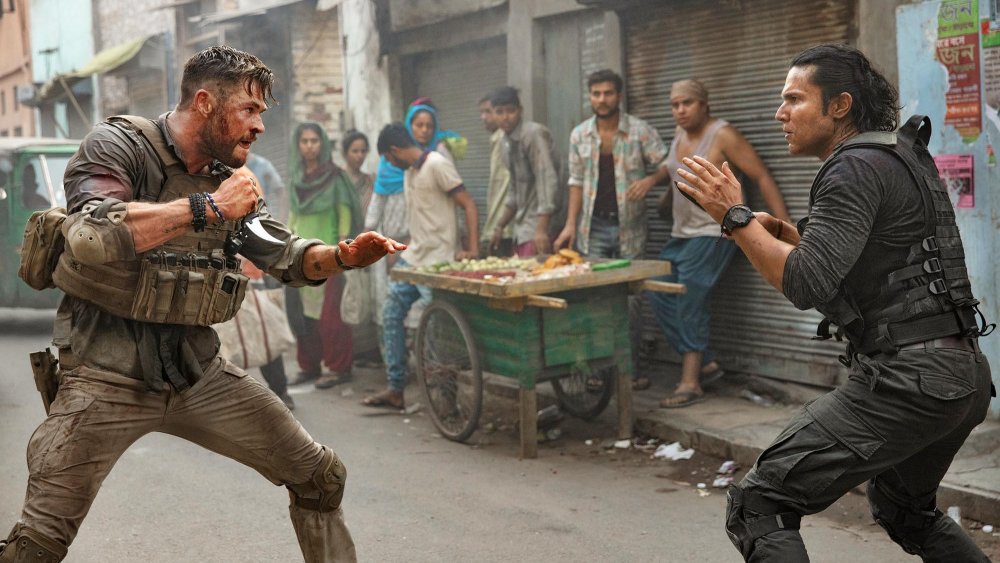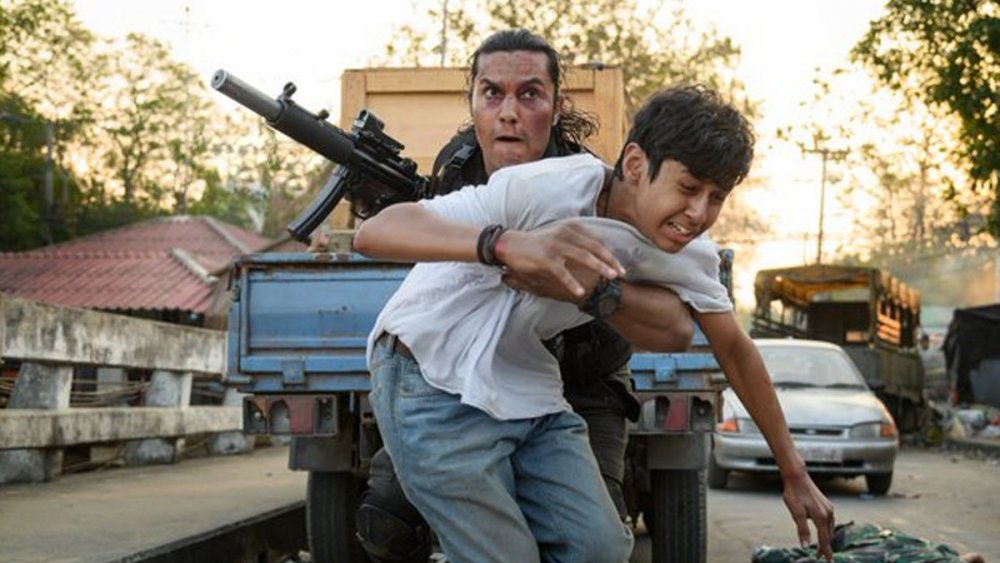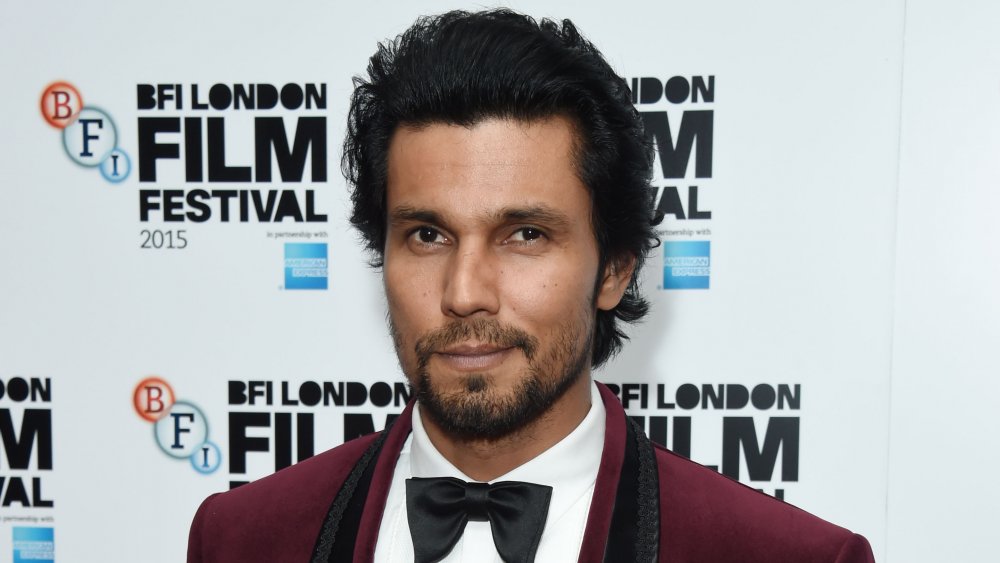Extraction Star Randeep Hooda On Action Movies, Irffan Khan, And Making Movies With Marvel Alumni - Exclusive Interview
Actor Randeep Hooda has been well known to fans of Hindi cinema for years, breaking out with 2005's D and making a name for himself in the world of drama. In 2020, however, he took two leaps at once, making his Hollywood movie debut in his first big action film, the Chris Hemsworth-led Netflix original Extraction. Cast in the role of a former Indian Special Forces member who now works for a drug lord whose son has been kidnapped, Hooda more than holds his own against the Marvel Cinematic Universe's god of thunder in MCU stunt coordinator Sam Hargraves' feature directorial debut.
It's a big step for the actor, and, in an exclusive interview with Looper, Hooda talks about making the transition from Hindi cinema to Hollywood, lays out his newfound love for action filmmaking, and dishes on what it's like to work with Hemsworth and Hargraves on the Russo Brothers-produced Extraction before paying tribute to recently deceased Hindi movie star Irrfan Khan.
Randeep Hooda makes the leap to Hollywood action
Extraction was your big Hollywood debut. Why was this the right project for you to make that transition?
It was a great part. The people involved... the Russo brothers, who are probably the biggest filmmakers on the planet right now. The reach that they have with their movies. Chris was a part of it. Sam was directing it, and it was an action picture. I've been offered a couple of these big Hollywood movies, but the roles have been rather derogatory, or have been very 7-11 clerk types. I thought this was something which any other Indian actor has not done, something we don't associate in general with Indian actors, so this was a great part and a great movie to be a part of.
You've mentioned in other interviews that you hadn't really done action filmmaking before. What drew you to it now? Why was now the time for you to take a plunge into an action role?
Oh, well, because I got one (laughs). You make your choices best out of what you get, so this is the one I got and I made that choice. And to tell you the truth, I really enjoyed it. Your body has a lot of abilities, as I discovered through this, and it's a great thing. And I would like to repeat it again.
What was that transition like going from the Hindi cinema world to the Hollywood filmmaking type of apparatus?
You do your part as an actor the same, and it's just the setup that's changed, and the setup was bigger, more organized and the scale itself was so much bigger than the drama movies that I've done here. The other difference would be probably the whole action part, the whole training, the safety. Here, I don't think we do as many rehearsals as we did over there. So, that eases you into this a bit more. Here, the process of rehearsals and readings is not that prevalent.
What was one thing that surprised you about action movie filmmaking, this being your first time in that milieu?
Well, man, we've grown up watching these big action movies, films such as Rambo and whatnot, the Bruce Willis movies, Steven Seagal movies, and you often wondered how they get that effect and how they do it so well and so believably, with all these fancy stunts. So, here you were after watching and wondering about these movies, you're in one and you're looking around and oh, this is how they do it.
So, that was cool. I mean this detail and the way they do it... like, I'm not driving the car for example. Here, I've oftentimes driven the car — in fact, gotten out of the car, switched on the camera, said, "Ready!" to the other actor, clap, drive yourself and then okay, cut. All right, come back. I've done that as well.
So, here, you were just put into this thing, everything is rehearsed, everything is done. I'm sitting in the car and there is a dude sitting in the boot almost, who's driving the car lying around, and he's got all that stuff to guide him. Little things like that, they were really fun. We learned to fight a bit better. They started with the punches and the reactions, and how these stood together. All those things are very new to me, and a new set, so that was very exciting, man.
Given all the technical aspects of making these big action movies with these big action scenes, is it a challenge in that environment to find a balance between the technical side of it and the character-building, emotional side of it as an actor?
Well, the first thing that happens is that you go through the action parts, rehearse it so many times that that becomes your second nature. You don't have to think about that part, and only when you're independent of thinking about the choreography and the things that we're going to do can you bring drama in it. So there was a lot of action preparation. It's in your body, so now what intention you're playing with, who you're with and what situation you are in the screenplay — it becomes easier. It's all the hard work you put in before the shots taken that actually makes the shot better, I believe.
Randeep Hooda on knife fighting with Chris Hemsworth
One scene to really get into is the knife fight between you and Chris Hemsworth. It's really an impressive piece of action. Was that all one shot, or did they edit it together to make it look it was one shot?
Oh, the knife fight? The knife fight was two shots. One of the shots was us getting up, and that whole thing that happens when we're leaning against each other, tired. I love that part, when I'm leaning on him, he's against the shutter and we take a breath, and then we start again. That little detail really, every time I've seen it, it really blows my mind that's something really thoughtful in an action scene to not do anything, because you are so tired after the fall and you're both trying to catch your breath.
And then, that part where I attack him again, that was another shot. So they did it like that. And every time there was a sweep off, or there was a scooter that drives past and all that, every time that happened, that was shot two.
They made it look really seamless. You guys memorized, like, 15 minutes of fight choreography.
Yeah. Chris had a lot more. His choreography with the pistol before the knife fight, I thought, was amazing.
How long did that whole sequence take to rehearse? I'm assuming you guys put a ton of work into it.
Oh, well, I think we were there two, three weeks before. It started from basic, and we got into the choreography slowly. "Slow is fast, fast is slow," they kept drilling into our heads. Michael was the fight choreographer, and so we went step by step and got it really well at a slow speed, and then at a pretty fast speed, and Chris trained separately. Then they brought us together for the last three, four days. And we rehearsed for hours like that. We were just talking and doing it so that we can then think of other stuff and not the fight while we were doing the shot. To actually shoot it, I think, a few hours.
What was the most challenging part of that sequence for you?
Oh, Chris has a lot of energy, man. He's full of power, he's full-throttle. So just to match up with that. Also, as you said earlier, to remember the drama, the desperation. I think the biggest thing that me and Sam discovered was the desperation, the emotional desperation, and someone who has not been doing it for a while and comes into it again. So, that whole giving it your all, well, for that and for your family as for the emotional need, is what really filled in those spaces and made that action, for me, more believable.
You're telling a story, so it's not just about the physical stuff you're doing. I thought that was really well done.
Yeah. The stunt guy who was doing most of the stunts was with me and Chris in the rehearsals, Dan. So he had a very athletic, very martial arts thing to go about it, just shifting on your feet so quickly, and all that. And towards the end of it, they said, "Now you have to put in this and so these stunt guys will show you, like, 'Aah!'" And I was, "Okay, man, let me get the choreography right, I'm going to fill it in with my own space." So, a combination of what they were doing, watching them and then of course doing it in your own way, you have to own it. So, that really worked, but their contribution was immense.
So, between you and Chris Hemsworth, who's the better fighter — at least in terms of movie fighting?
Definitely Chris, he's got a lot more experience with it. Definitely. But I don't know, I think I might have been able to fill those spaces with a lot more screen play, so to speak. It comes across as good, probably. I hope.
One of the things that was interesting about your character, in particular, is how sympathetic he becomes over the course of the film, even though he's an antagonist to Chris Hemsworth for a lot of the time. Is that a difficult line for you to tread as an actor between making someone threatening but also someone the audience will identify with?
You're following your own intention, which is to get the boy back, and this person is a tool for it. You need to get the boy back because if you don't get him back, your boss is going to kill your boy. That thing is what feeds all of it at the same time. So, my plan was, he'll bring the boy out of Dhaka to a certain place, and from there, I'm going to snap him and take him away, but it turns out to be Chris Hemsworth, so it's hard to snap him out. And then, when you think you've got it, you call your family and say, "If I don't make it, you got to disappear." And then I get another opportunity when he calls me to join him. And when he does that, I'm following their intention. The intention is still to get the boy out, with or without him.
So what was working with Chris Hemsworth like? How is he on set as an actor to bounce off?
Man, he knows his lines well. He's prepared. I really admire that, and I tried to do it myself. I like people who come prepared and who have already... he was always there and while shooting, I mean you can see him, you're looking him in the eye, in the shot. He's right there. But otherwise, also I think he's very chilled out, a very down to earth guy, very witty, but very energetic. And he's very happy. There's a certain happiness about him, and very respectful. He's a very nice guy to work with overall in and outside the shot.
So, he's not walking around brandishing Thor's hammer?
(Laughs) My nephew got Thor's hammer. He never turns up to my shoot, but my nephew brought Thor's plastic or rubber hammer, and he says, "You got to get it signed by him, or I want to smash your head with it."
Oh no.
So the hammer was all there, man. My kids and my family were crazy about it.
Randee Hooda on Sam Hargrave and action movies
The other Marvel connection in the film is Sam Hargrave, the director coming over from stunts on the Marvel movies. And this was his directorial debut from a feature film perspective. What did he bring to the table that was unique as a director working on Extraction?
It did not for a moment feel like you were working with a first-time director, per se. He's had a lot of experience. He was a second unit director for Endgame. So there was nothing about him which was... he was very open. He would adapt through the scenario, and if you've got something you feel like doing, he'll just say, "Yeah, try it." Otherwise, you do another one. So that confidence and security he's got about him, it didn't feel like a first-time director who's fumbling around the place. It was great working with him.
He has a sense of a big picture and at times, he's the one operating the camera, and you need somebody with that physical prowess and experience handling the camera, holding the frame, and still going about with the actors even coming down ropes, when the actors or when people are falling, and then being strapped on the back of cars or getting into cars and all that, and going over that jump, he did that with the camera. Of course, the cable was there but still to do it and hold the frame...
And he's the director, so he knows the frame he wants instead of telling the DOP (Director of Photography), DOP telling the operator, it becomes a thing. So that was a very, layer-wise, thin communication between the camera and the director, because he, himself, was holding it. If it wasn't for him this would not have turned out like that.
His whole stunt team, they have been working with him for a long time, so it was like they had a family relationship or friendship, and they were all really very well coordinated, their communication. If Sam wasn't there, neither was the action. And I thought he handled the drama part very well, the emotional scenes, you would not expect a so-called stunt director to handle that, but I think he handled them very well with all characters. It didn't seem he was a first-time director. The big movie experience from Avengers gave him the confidence.
From a character standpoint, what was something he told you or worked with you on that really impacted how you portrayed the character in the film?
He said, "Silent warrior." We came upon it. We started talking about westerns, Louis L'Amour. That was a starting point of our conversation, the western genre, which I'm also very fond of. We talked about various movies and characters, and then we talked about how there are three types of characters in The Good, The Bad and The Ugly. From there we went on to "Okay, so he's none of them, but it's like an archetype character." From there we went into what character would it be, and then, obviously, adapted it to the drama of the film and role.
How present were the Russo brothers in terms of the actual production of the film? Were they involved creatively, day-to-day?
Not that I ever saw. I never met them. They did visit the set, but I wasn't on set or on location on those days. I had no contact with them whatsoever, though I was really grateful, and I wrote them a letter after I saw the movie. But otherwise, I had no inclination that they were involved, it all seemed it was all Sam and Patrick Newall, who's the line producer. He was the guy, and he was enjoying India and the setup was absolutely amazing in that sense. It was so well-run and I told him, "You're spoiling me for the Indian industry."
Did you include a little note in your letter to the Russos about getting in a future Marvel movie?
(Laughs) No, that would be pushing it. Hey, man, I got this out of the universe. If that Marvel Universe is meant for my universe, I'll probably be in that universe. If not, then no.
But now that you've had a taste of this action movie filmmaking, is that something that you want to pursue further moving forward?
Yes. We were rehearsing one day, and I turn to Sam, who was sitting there with his assistant looking at the rehearsals, and I went to him, I said, "Hey man, I don't want to do drama anymore. I want to get jacked, I now want to be an action star." It's so much fun.
What was the highlight stunt for you or the highlight action bit for you in the film?
Well, of course the obvious ones we've talked about. There's another one where I've pinned the guy to the ground, I changed the magazine and then shot at him. I thought that was really cool. I change the magazine with my gun at his throat. I thought that was pretty cool.
So, it feels as cool doing it as it looks on the screen, for the most part?
Oh, yeah, man. When you start off you're, okay this, then okay this, you're fumbling around, but by the second day, you know, you're doing it. And then there is a different concentration and stuff that you have to do in a take, where you're following the desperate situation, is there somebody around or not, so to be able to do that you have to do it, like, a hundred times so that you get it right.
Randeep Hooda on Irrfan Khan
The world recently lost a icon of Hindi cinema in Irrfan Khan, and I wanted to get your take on that. Have you ever interacted with him yourself?
Yes, I have. I met him a few times. I did a movie called Saheb Biwi Aur Gangster, and he played the gangster in the second part, I played it in the first part. [We saw each other at] the wrap party, I mean the premier party, and all that. After that, a couple of times later, I did meet him, and I did go up to him, and I said, "Well, what do you think, Irrfan, brother? What else can I do?" He says, "You're doing it. You're finding your way."
He was very generous. He was very nice. There was something about him, his eyes and generally the person he was, the long struggle he's had from big parts to this almost three decades, and how he's kept his own way, the choices that he's made, he's very wonderful as an actor. He was quite inspirational, to watch his performances. I mean, I saw Namesake, that was really out of this world. Then Warrior was his first breakthrough in the international thing.
And this movie released on the weekend, and he passed away. And he's buried right next to my house in the Muslim graveyard. And somebody told me that he's being buried there, so I put on my mask and everything and I walked down and I paid respects to him, maintaining social distance and everything. So I was able to do that. Although I didn't know him that well, he was a great artist, and salute, man. Thank you for all that. And it felt strange that I'm having a big international debut and then he's passed away and right next to my house, he's buried.
